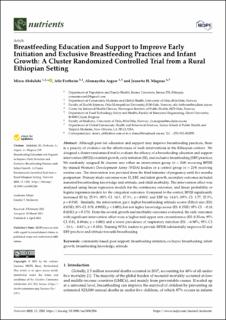Breastfeeding Education and Support to Improve Early Initiation and Exclusive Breastfeeding Practices and Infant Growth: A Cluster Randomized Controlled Trial from a Rural Ethiopian Setting
Peer reviewed, Journal article
Published version

View/
Date
2021-04-06Metadata
Show full item recordCollections
Abstract
Although peer-led education and support may improve breastfeeding practices, there is a paucity of evidence on the effectiveness of such interventions in the Ethiopian context. We designed a cluster-randomized trial to evaluate the efficacy of a breastfeeding education and support intervention (BFESI) on infant growth, early initiation (EI), and exclusive breastfeeding (EBF) practices. We randomly assigned 36 clusters into either an intervention group (n = 249) receiving BFESI by trained Women’s Development Army (WDA) leaders or a control group (n = 219) receiving routine care. The intervention was provided from the third trimester of pregnancy until five months postpartum. Primary study outcomes were EI, EBF, and infant growth; secondary outcomes included maternal breastfeeding knowledge and attitude, and child morbidity. The intervention effect was analysed using linear regression models for the continuous outcomes, and linear probability or logistic regression models for the categorical outcomes. Compared to the control, BFESI significantly increased EI by 25.9% (95% CI: 14.5, 37.3%; p = 0.001) and EBF by 14.6% (95% CI: 3.77, 25.5%; p = 0.010). Similarly, the intervention gave higher breastfeeding attitude scores (Effect size (ES): 0.85SD; 95% CI: 0.70, 0.99SD; p < 0.001), but not higher knowledge scores (ES: 0.15SD; 95% CI: −0.10, 0.41SD; p = 0.173). From the several growth and morbidity outcomes evaluated, the only outcomes with significant intervention effect were a higher mid-upper arm circumference (ES: 0.25cm; 95% CI: 0.01, 0.49cm; p = 0.041) and a lower prevalence of respiratory infection (ES: −6.90%; 95% CI: −13.3, −0.61%; p = 0.033). Training WDA leaders to provide BFESI substantially improves EI and EBF practices and attitude towards breastfeeding
Publisher
MDPISeries
Nutrients;Volume 13, Issue 4Journal
NutrientsCopyright
© 2021 by the authorsRelated items
Showing items related by title, author, creator and subject.
-
Breast-feeding and complementary feeding practices in the first 6 months of life among Norwegian-Somali and Norwegian-Iraqi infants: the InnBaKost survey
Grewal, Navnit Kaur; Andersen, Lene Frost; Sellen, Daniel W; Mosdøl, Annhild; Torheim, Liv Elin (Journal article; Peer reviewed, 2015)Objective: To examine breast-feeding and complementary feeding practices during the first 6 months of life among Norwegian infants of Somali and Iraqi family origin. Design: A cross-sectional survey was performed during ... -
Breastfeeding in Iran: prevalence, duration and current recommendations
Yngve, Agneta; Strandvik, Birgitta; Olang, Beheshteh; Farivar, Khalil; Heidarzadeh, Abtin (Peer reviewed; Journal article, 2009)Background: The need to promote breastfeeding is unquestionable for the health and development of infants. The aim of this study was to investigate prevalence, duration and promotion of breastfeeding status in Iran with ... -
Experiences from the establishment of the first human milk bank in Viet Nam
Berger, Mia Kopland (MAEH;2017, Master thesis, 2017)Background: Mothers` milk is essential to cover nutritional needs for growing infants, especially for those who are premature or sick because they are at a greater risk of death than full term infants. Studies have shown ...
